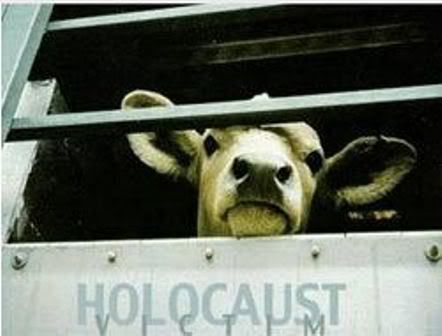The article comparing the treatment of animals to the Holocaust alerts the reader to realize the striking similarities that we as a society tend to put in the back of our minds because we do not want to think about. Reality is knocking and we must answer it! It is true that “animals as victims are often ‘voiceless,’ with little or no attempt by others to advocate on their behalf. Historically, the Jews, for their part, were often sentenced, ignored, and disenfranchised (741). Continuing with these graphic ideas it is also true that “Jews were transported via ‘cattle trucks’ and then cars to death camps. Cattle-cars are still common means of transporting animals to killing sites” (743). Szytbel’s article displays the reality society does not want to see, read, or hear about and validates the analogy between animal treatment and the Holocaust. Just look below to the picture of corpses. Doe the pigs not look the same as the humans? Thus, Elizabeth Costello is valid in using this analogy in her speech at Appleton College. However, she does fade back into society by not acting upon the issues she feels so passionate about.


Mrs. Costello’s speech at Appleton College was a strong performance for animal rights in the strong analogy between the Holocaust and animal treatment. She explained that “we are surrounded by an enterprise of degradation, cruelty, and killing which rivals anything that the Third Reich was capable of, indeed dwarfs it, in that ours is an enterprise without end” (65). Not only does she shock this crowd with this analogy but suggests that our treatment of animals is a similar genocide that has no end. These are very strong words that represent the reality of animal treatment then and now. After her speech she is unjustly accused of “anti-Semitism” and called a “fascist bitch” for showing the society the reality of animal treatment in a graphic way that they could relate to.
However strong her points may be, Elizabeth Castello also represents the people she attacks for the treatment of animals. She does not act on the ideas she lectures on. She even admits to “wearing leather shoes,” and “carrying a leather purse” before informing President Gerrard that “I wouldn’t have overmuch respect if I were you” (89). I do not believe that Elizabeth Costello is a fraud. She merely represents society’s preference to eat the meat in the comforts of their own homes without realizing the inhumane slaughter of animals because she prefers to only announce her ideas and does not act upon them. After she attacks fellow author Paul West at a conference in Amesterdam for writing about the killings of Holocaust officers, Costello is called out on her ill-action when an audience member asks her “How do you know?” (175). He continues to explain that “If I understand you correctly, you are saying that if you yourself had written this book about von Stauffenberg and Hitler you would have been inflected with Nazi evil. But perhaps all that says is that you are, so to speak, a weak vessel. Perhaps Mr. West I made of sterner stuff. And perhaps we, his readers, are made of sterner stuff too” (175). The audience member’s remark brings up a double negative. One, he is right in that Costello is a weak vessel because she is strongly affected by the writing concerning these killings, yet she does nothing regarding the treatment of animals even though this is the part of her great analogy to the Holocaust. Two, even though West’s readers are made of “sterner stuff” they do not act upon the graphic imagery they are reading about.
Coetzee does an excellent job of portraying society through Elizabeth Costello. We know right and wrong, yet we choose to put the realistic inhumane treatment of animals out of sight and mind. The frustration the reader feels with Costello’s inability to be a hero and do something about the subject she preaches upon mimics the frustration we should feel as a society. The analogy between animal treatment and the Holocaust is real. It’s a graphic analogy that has been proven valid. So why then have we as a society, a culture, a citizen, or a race done anything about it??


No comments:
Post a Comment